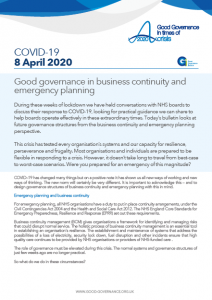Good governance in business continuity and emergency planning
08 April 2020

During these weeks of lockdown we have held conversations with NHS boards to discuss their response to COVID-19, looking for practical guidance we can share to help boards operate effectively in these extraordinary times. Today’s bulletin looks at future governance structures from the business continuity and emergency planning perspective.
This crisis has tested every organisation’s systems and our capacity for resilience, perseverance and frugality. Most organisations and individuals are prepared to be flexible in responding to a crisis. However, it doesn’t take long to travel from best-case to worst-case scenarios. Were you prepared for an emergency of this magnitude?
COVID–19 has changed many things but on a positive note it has shown us all new ways of working and new ways of thinking. The new norm will certainly be very different. It is important to acknowledge this – and to design governance structures of business continuity and emergency planning with this in mind.
Emergency planning and business continuity
For emergency planning, all NHS organisations have a duty to put in place continuity arrangements, under the Civil Contingencies Act 2004 and the Health and Social Care Act 2012. The NHS England Core Standards for Emergency Preparedness, Resilience and Response (EPRR) set out these requirements.
Business continuity management (BCM) gives organisations a framework for identifying and managing risks that could disrupt normal service. The holistic process of business continuity management is an essential tool in establishing an organisation’s resilience. The establishment and maintenance of systems that address the possibilities of a loss of electricity, security lock down, fuel disruption and other incidents ensure that high quality care continues to be provided by NHS organisations or providers of NHS-funded care[1].
The role of governance must be elevated during this crisis. The normal systems and governance structures of just few weeks ago are no longer practical.
So what do we do in these circumstances?
Decision-making in times of crisis
The usual decision-making machinery can no longer be relied upon but key decisions still need to be made. Good governance must prevail. Now is the perfect time to put business continuity and emergency preparedness plans to test. In most cases, committee structure, governance mechanisms and delegated powers do not traditionally form part of a business continuity plan – but they must.
One extreme option is that a board can legitimately suspend its standing financial instructions, standing orders, scheme of delegation and its sub-committees. Other options include reducing the remit of committees and only focusing on key decisions. Special remit and time-bound assurance committees can be established to hold the fort.
Virtual is the new real
Microsoft Teams, Zoom, Skype for Business, GoToMeeting and many other tools have been adopted to create a new way of working. Board meetings are being conducted in virtual rooms, using facilitation methods and ways of conducting business that are suitable for an online environment.
A positive take on this change is that it has resulted in focused and effective decision-making. Boards should consider what elements of this new norm to retain when the situation eases, to become more efficient and effective. But they should also consider questions such as how to ensure the public’s voice is heard at virtual board meetings.
Risk and risk appetite
The governance of decision-making based on informed and managed risks in times of crisis may require trusts to introduce emergency risk appetite statements.
In times of crisis, the risk appetite of an organisation increases. However, in some areas, risk appetite may move completely in the opposite direction, such as a zero-tolerance approach to accepting reduced/compromised quality of services.
Call to action
So what does this all mean in terms of business continuity and emergency planning?
First, boards should review their emergency preparedness and business continuity plans, looking at the governance implications of the crisis and what a board can resort to in such situations.
More than ever, boards must also keep good records. Times of crisis naturally take us into the territory of ‘apply and explain’ rather than ‘comply and explain’. As we have said before, mistakes will be made so it is better to record too much than too little.
Good governance must always add value and be purposeful. If that purpose today is responding to a global crisis, tomorrow it must be to ensure we are better prepared and ready to reassess business planning and emergency planning processes.
GGI is currently offering an advisory service free of charge to all public sector organisations and their boards. If this briefing prompts any questions or comments, please call us on 07732 681120 or email us at advice@good-governance.org.uk with brief details and we will aim to respond within 24 hours.
--------------------------------
[1] NHS England Emergency Preparedness, Resilience and Response (EPRR)

